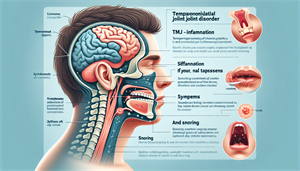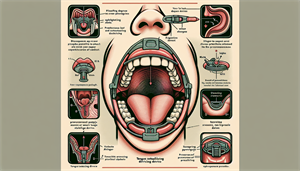
Finding Solutions for a Restful Sleep
Do you often find yourself waking up feeling tired or experiencing jaw pain and headaches throughout the day? You might be dealing with temporomandibular joint (TMJ) disorder, which raises the question, “does TMJ cause snoring?”
This can affect your sleep quality and finding solutions for a restful sleep is crucial not only for your overall well-being but also for maintaining healthy relationships with those around you.
Understanding TMJ and Its Connection to Snoring
Temporomandibular joint disorder, or TMJ, is a condition that affects the jaw joint, leading to discomfort and dysfunction. This dysfunction can result in snoring, which in turn may impact your sleep quality and overall health.
Snoring due to TMJ can be particularly concerning if left untreated, as it may exacerbate sleep apnea, a serious sleep disorder that can lead to further health complications. Gaining insight into the link between TMJ and snoring can facilitate the identification of the cause behind your sleep problems and guide you towards appropriate treatment options.
What is TMJ?
Temporomandibular joint (TMJ) disorder affects the joint connecting the jaw to the skull, resulting in pain and discomfort. Although the exact cause of TMJ is often unknown, potential causes may include: Genetic predisposition, Arthritis, Jaw injury, Excessive strain on the jaw joints and muscles, Teeth grinding, Trauma to the jaw, Persistent stress. TMJ disorder is fairly prevalent worldwide, with studies showing that it affects between 7% to 30% in adolescents and 2% to 8% in males and 4% to 15% in females in adults.
How TMJ Affects Jaw Function
The temporomandibular joint is fundamental to a variety of jaw movements, including opening and closing the mouth, lateral jaw movements, and facilitating motions of the lower jaw. TMJ disorder can result in pain and dysfunction in the jaw joint and muscles controlling jaw movement, causing jaw discomfort, limited jaw function, and soreness in the jaw. This dysfunction can make everyday tasks, such as: Chewing, Talking, Yawning, Swallowing.
The effects of TMJ disorder on chewing ability can be particularly concerning, as it can impair the bite and decrease the ability to bite and chew properly. Additionally, research has indicated that TMJ disorder may have an indirect correlation with speech clarity, as it can cause various issues in the mouth and jaws.
The Link Between TMJ and Snoring
TMJ may lead to snoring as it can cause the lower jaw to shift forward and block the airway. This is particularly concerning in cases of obstructive sleep apnea, where individuals may experience a constriction of the airway, leading to the lower jaw being pushed forward in an attempt to open the airway. By moving the lower jaw forward, this can cause stress and tension on the jaw joint, thereby increasing the risk of TMJ disorder.
Research has indicated that men and women with two or more signs/symptoms of obstructive sleep apnea had a 73% greater incidence of first-onset temporomandibular disorder (TMD) compared to those with fewer signs/symptoms. This underscores the notable association between sleep apnea and TMJ, emphasizing the need to tackle both conditions to enhance sleep quality and general health.
Common Symptoms of TMJ-Related Snoring
If you’re experiencing TMJ-related snoring, you may encounter common symptoms such as loud snoring, daytime sleepiness, and jaw pain/headaches. These symptoms can significantly impact your daily life and overall well-being.
Seeking professional help is crucial if persistent symptoms are affecting your quality of life. Understanding the symptoms and seeking appropriate treatment can help alleviate the impact of TMJ-related snoring on your sleep quality and health.


